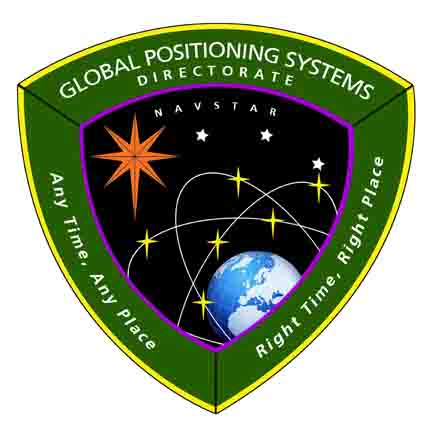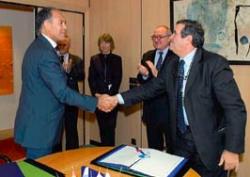
Prompted by a congressional footnote in the 2009 Omnibus Appropriations Act signed into law last month, the Office of the U.S. Trade Representative (USTR) is soliciting public comment on American industry’s access to the Galileo program and related markets.
Prompted by a congressional footnote in the 2009 Omnibus Appropriations Act signed into law last month, the Office of the U.S. Trade Representative (USTR) is soliciting public comment on American industry’s access to the Galileo program and related markets.
A notice published in the April 15 issue of the Federal Register invites comments on six questions regarding U.S. equipment manufacturers’ ability to participate in Europe’s GNSS program. The invitation identified three specific sections — Articles 5, 6, and 8 — of the 2004 Agreement on the Promotion, Provision and Use of Galileo and GPS Satellite-Based Navigation Systems and Related Applications between the European Community (EC) and the United States. Interested individuals and companies have until May 13 to respond.
The agreement, which has provided the basis for establishing a common civil signal design at the L1 frequency — the muliplex binary offset carrier (MBOC), has not yet entered into force but is being provisionally applied while waiting for signatures by a couple of remaining European Union (EU) member states — numbering 25 nations at the time of the signing.
An “explanatory statement” accompanying the Omnibus Appropriations Act requested the USTR to assess the EC compliance with the trade-related elements of the agreement. The public comment period initiates that process, which will lead to a USTR report to Congress.
The Comment Process
To assist it in fulfilling that request and identifying matters that merit further discussion with the EC and its member states in connection with the consultation mechanism provided under the agreement, the USTR is seeking comments on the following issues as set forth in the Federal Register notice:
(1) Has the EC or any of its Member States established any measures of the type described in Article 5.1 of the Agreement that adversely affect U.S. equipment industry access to Galileo navigation and timing signals and services, value added services, augmentations and global navigation and timing goods, or European markets for related goods and services?
(2) Has the EC or any of its Member States established any measures that have the effect, directly or indirectly, of mandating the use of any civil satellite-based navigation and timing signals or services, value-added service, augmentation, or global navigation and timing equipment within its territory, not expressly authorized by the International Civil Aviation Organization or the International Maritime Organization, as described in Article 5.2 of the Agreement?
(3) Does the EC or any of its Member States maintain a non-discriminatory approach with respect to trade in goods and services related to civil satellite-based navigation and timing signals, augmentations, and value-added services, consistent with the affirming statement contained in Article 6.1 of the Agreement?
(4) Are any EC or Member State measures with respect to goods and services related to civil satellite-based navigation and timing signals or services, augmentations, and value added services used as a disguised restriction on or an unnecessary obstacle to international trade, as described in Article 6.2 of the Agreement?
(5) Does the EC make publicly available on a non-discriminatory basis, sufficient information concerning its unencrypted civil satellite-based navigation and timing signals and augmentations, consistent with Article 8.1 of the Agreement?
(6) To the extent that it provides civil satellite-based navigation and timing signals or services, augmentation, or value-added service for civil users that is encrypted or otherwise has features that allow the global navigation service provider to deny access, does the EC or any of its Member States, subject to applicable export controls, afford to U.S. manufacturers of global navigation and timing equipment or augmentation or value-added services providers, on a non-discriminatory basis, access to the information necessary to incorporate such encryption or other similar features into their equipment, through licensing of necessary information or other means at market prices, consistent with the terms set forth in Article 8.2 of the Agreement?
Comments may be submitted electronically to http:// www.regulations.gov, docket number USTR–2009–0010, and will be open to public inspection, except for confidential business information. Comments may be viewed on this website by entering docket number USTR– 2009–0010 in the search field on the home page.
Confidential business information may be submitted separately only by fax to Gloria Blue, Executive Secretary, USTR Trade Policy Staff Committee, at (202) 395–3475. A non-confidential summary of the confidential information must be submitted to http://www.regulations.gov, where it will be placed in the docket and open to public inspection.
All questions other than those relating to confidential business information should be directed to Scott Pietan, Director of Industry, Office of the United States Trade Representative, 600 17th Street, NW, Washington, D.C., (202) 395–9646.
Behind the USTR Effort
Among the matters driving the industry initiative is the delay in publication of a final interface control document (ICD) with the technical specifications for Galileo, even though the system has two prototype satellites on orbit transmitting some of the planned signals.
A provisional Galileo signal-in-space (SIS) ICD came out nearly three years ago and an update incorporating the MBOC appeared in April 2008. However, the SIS ICD prohibits commercial exploitation of the system without approval by European authorities — including general sales of Galileo-capable signal generators and simulators needed to build GNSS receivers.
That situation handicaps private companies — European and non-European alike — that want to develop user equipment and services based on the SIS ICD. They can do so, but only with the risk that the specifications will change substantially and, in any case, without the ability to commercially exploit their developments and recover their investments. Reportedly, some simulator manufacturers have gained approval to sell their equipment without license.
A note on the European GNSS Supervisory Authority (GSA) — soon to be known simply as the GNSS Agency following a new EC communication issued late last month — indicates that “the planned timeline for the Galileo SIS ICD updates, and the associated publication plan (including Service ICDs), will be provided by early 2009.” That timeline and milestone — already somewhat overdue — followed a consultation and comment period with industry and other stakeholders that ended last June.
Furthermore, some U.S. companies have complained that European companies building Galileo test equipment under contracts with the European Space Agency (ESA) are gaining an unfair advantage over non-European companies excluded from the competition.
Although the intent of the UTR request for comment focuses on manufacturers of user equipment and service providers — the so-called “downstream markets,” some U.S. satellite manufacturers have also felt stymied by the procurement for the Galileo infrastructure deployment — essentially the space and ground segments — now under way.
The invitation to tender ostensibly allows companies from countries not members of the EU or ESA to take part as subcontractors on parts of the system development that don’t involve security-related elements. However, at least one U.S. satellite builder has been dropped from a consortium headed by a European partner and competing for a Galileo space segment contract.
Under the terms of the 2004 accord, a working group (WG-B) on trade and civil applications was established to deal with these issues. During the transition from the Bush to Obama administrations, those efforts have been hampered by the absence of a director in the U.S. Department of Commerce’s Office of Space Commercialization following the resignation of Ed Morris, who joined ITT Space Systems Division in January.





